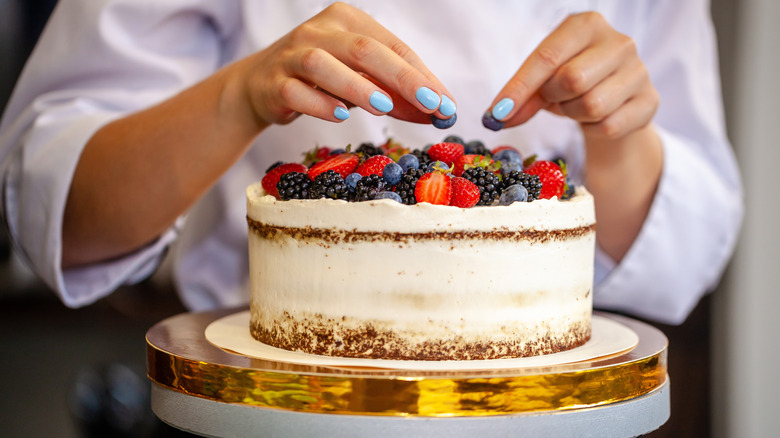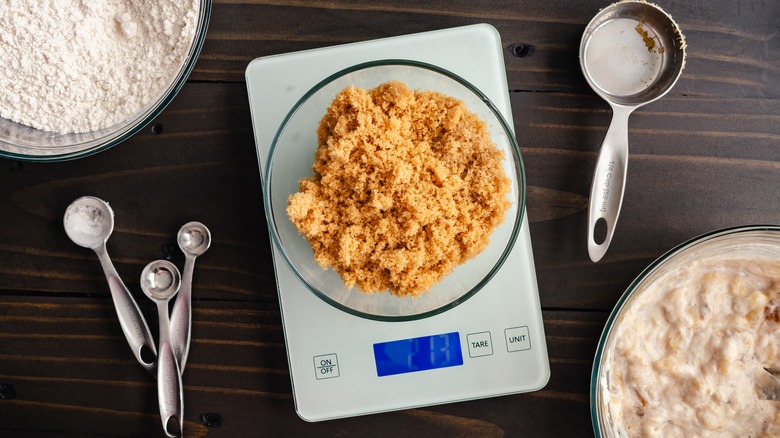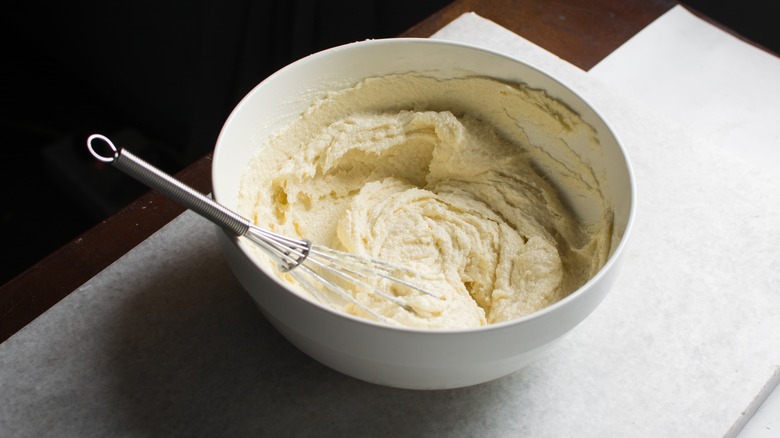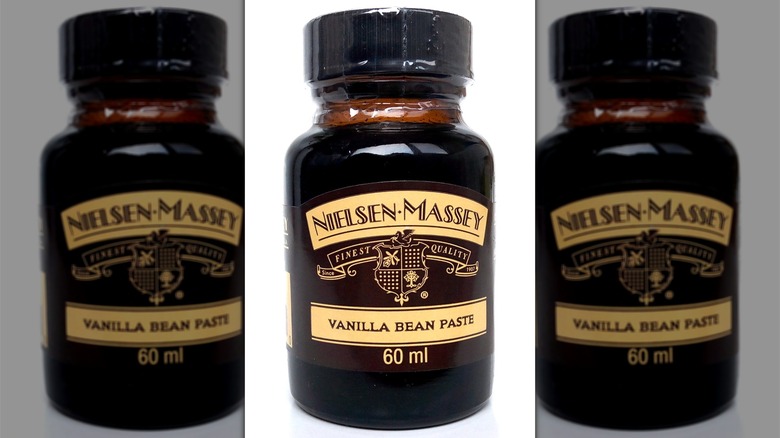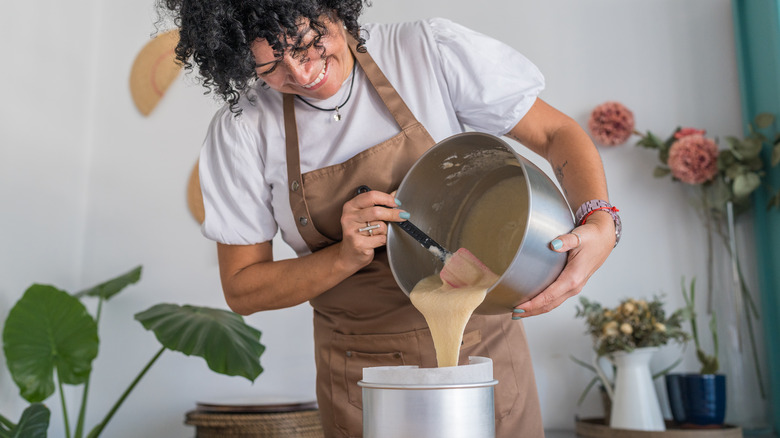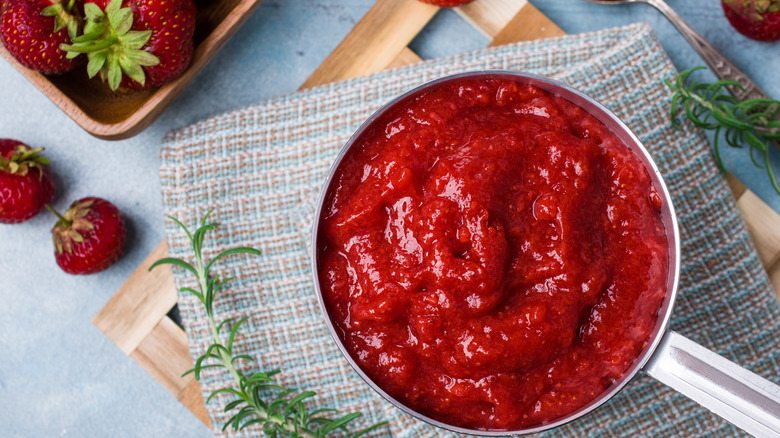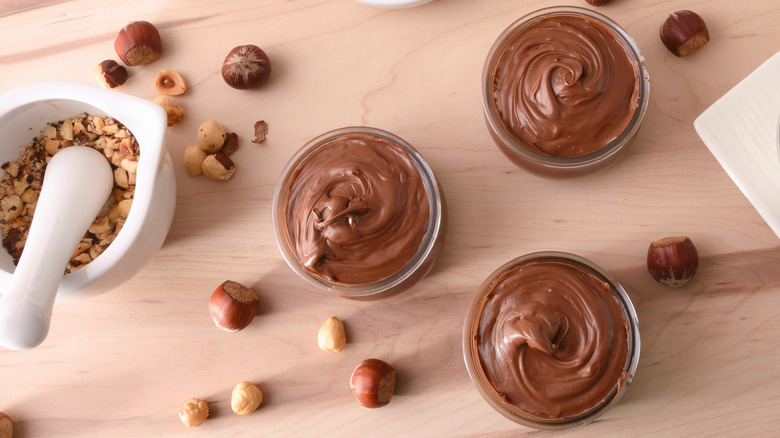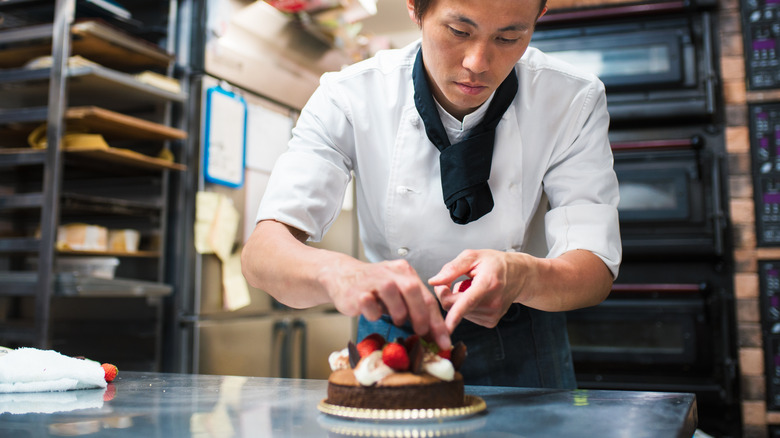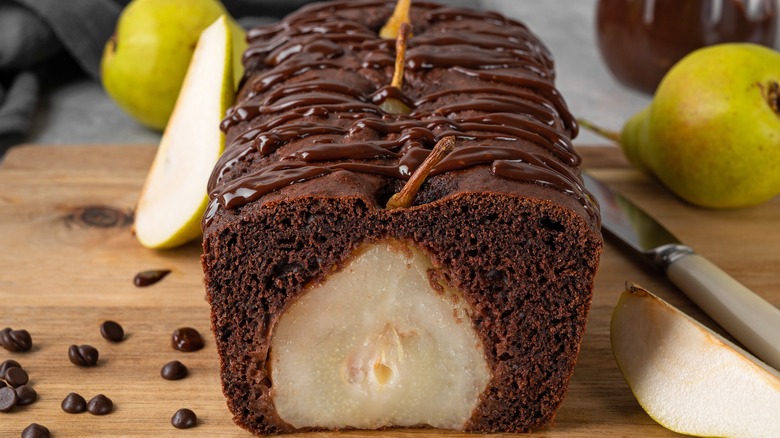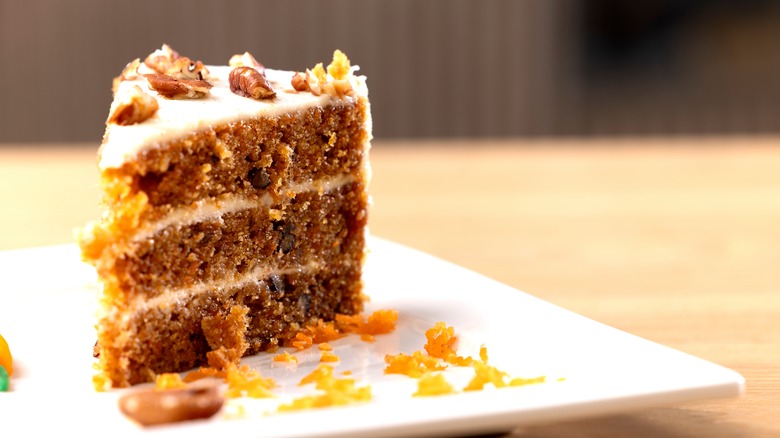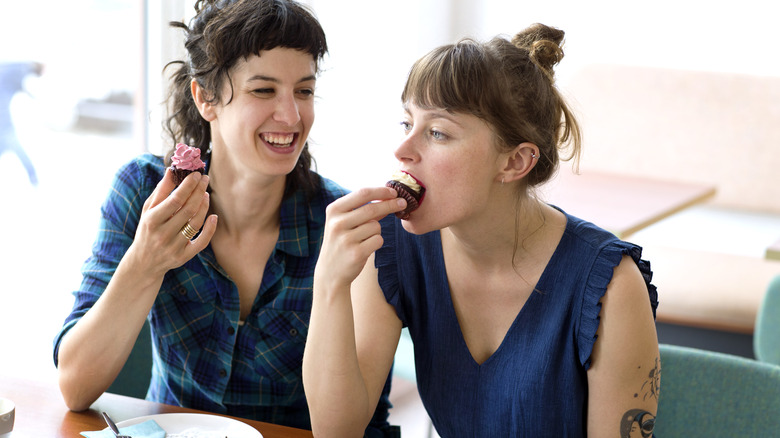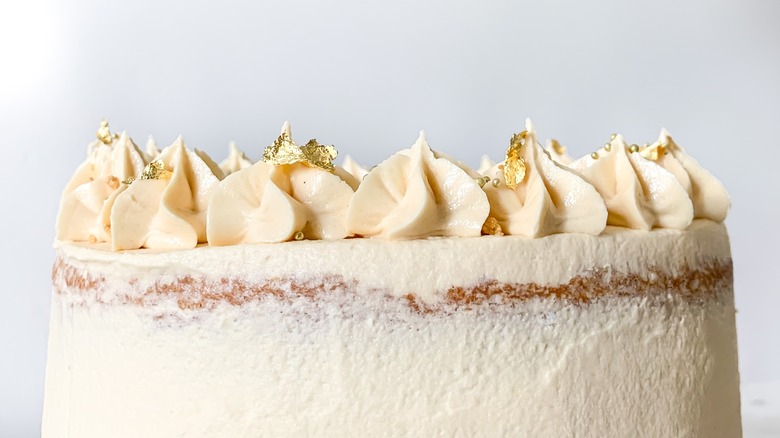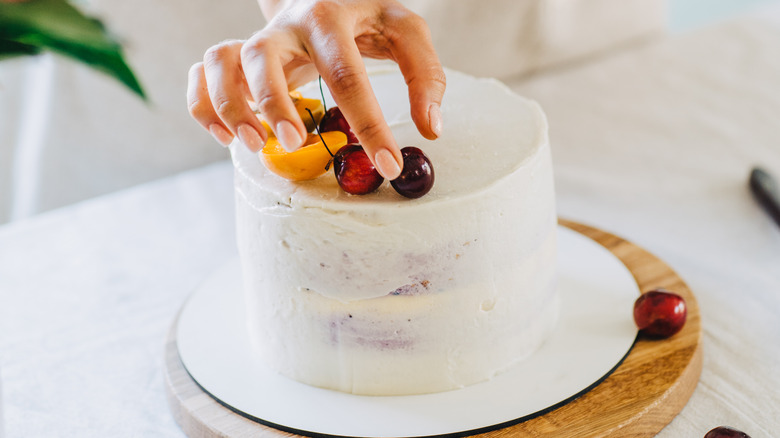How Bakery Cakes Get The Edge Over Homemade, According To Experts
Cakes all contain the same basic ingredients — flour eggs, milk, and sugar — so why is it that some are so much better than others? Cakes from a bakery almost always taste better than homemade ones and it might seem like a bit of a mystery. Even if you consider yourself good with cakes, the one that you buy from that local artisan bakery is next-level.
We wanted to understand why, so we interviewed three professional bakers and pastry chefs. They unloaded some of the secrets to making great cakes to help us find out why bakeries are doing it better. The reasons range from the simple — such as carefully weighing out ingredients and making high-quality frostings — to those that take a bit more time and practice to perfect — like balancing flavors and spending countless hours perfecting recipes.
Keep reading and you'll soon find out how bakery cakes get the edge over homemade, according to experts. If you want to improve your cake making skills, there's some valuable information here to help you do it like the pros. Alternatively, you might finish reading this, resign yourself to the fact that baking great cakes is hard, and head out to your favorite bakery instead. And, both options are totally valid.
Bakers use scales to weigh ingredients accurately
Sure, measuring cups are quick and convenient but professional bakers usually use kitchen scales. The reason why you should weigh your baking ingredients is that it's more accurate. And, that's why the pros do it. You can expect much more consistent results and your recipes are likely to turn out better.
Melody Hu, the founder of gluten-free and allergen-conscious bakery Sweet Diplomacy says you should use "scales to weigh ingredients, always." She explains that "in pastry science, precision is important" and "volume measurement leaves way too much interpretation and variables."
You see, when you measure ingredients by volume, there are things that can change the outcome. For instance, if you scoop flour from the bag, you'll get more in a cup than if you pour it into the cup and level it off with a knife. Or, when you measure brown sugar, it makes a difference whether it's tightly or loosely packed. Recipe writers don't often specify exactly how they measured out ingredients, so your results can differ. On the other hand, 8 ounces of flour is always 8 ounces of flour. Follow a recipe that uses weight measurements and you'll get the same results as the recipe writer and it will be consistent time after time.
Professional bakers know when to use oil and when to use butter
Some people are team butter when it comes to cake, enjoying the richness it brings. Others prefer oil for its ease in all-in-one recipes and the moist crumb it brings. However, the real key comes from knowing when to use oil and when to use butter. Both are great options for different reasons and work best in various types of cakes.
"I use both oil and butter to make cakes, it depends on the cake to which fat I use or a combination," says Adriano Zumbo, a world-renowned professional pastry chef, as well as a cooking school instructor and TV personality on shows such as "Zumbo's Just Desserts" and "Sugar Rush." However, he adds that "oil is my go-to in most as it gives a lovely moistness and softness to a lot of cakes."
Using a combination of both oil and butter is also an option. "We use a combo of oil and butter for our cakes to achieve both things: moistness from the oil and flavor from the butter," remarks Sherrie Tan, pastry chef at Chicago bakery Sweet Mandy B's. Which one you use might also depend on whether you're catering for any allergies or dietary preferences. "At Sweet Diplomacy, we use oil primarily for cakes because we specialize in special diets," Melody Hu tells us. "Omitting butter allows us to serve more people who need dairy-free products."
Cake from a bakery is made with high-quality extracts
When you're making cake, the cost of ingredients soon adds up. So, we understand why you might opt for the cheapest extracts and essences you can find at the store. However, cakes from bakeries are usually made using real vanilla extract and other high-quality extracts. This makes a big difference to the flavor.
"The quality of extracts is super important," pastry chef Adriano Zumbo explains. He remarks that cheap extracts can taste fake and ruin your baked goods. Whereas, "good quality extracts pull their weight in performance, giving great flavor consistency and performance in hot and cold use." Professional bakers usually have favorite extracts and they aren't always cheap. "My favorite vanilla extract is Nielsen Massey's Madagascar Bourbon Vanilla Extract," says Melody Hu of Sweet Diplomacy. "The flavor is warm, rich, and fragrant; however, the high price point is definitely a splurge," she adds.
Professional bakers may also use high-end products like vanilla bean paste or even real vanilla beans in their cakes. But, they're likely to pick and choose where to use them to make the most of their flavor. "Whole vanilla beans and vanilla bean paste are great for pastry creams and custards, where the lower temperature heating and the texture of the finished product allow the flavor of the vanilla beans and the visual specks to shine through," explains Hu.
Bakers know how to adjust mixtures for variables like humidity and temperature
Most home bakers have had the experience of making a cake they've baked a hundred times before, only to find it doesn't come out as expected. This can be baffling — and annoying. But, it's usually down to atmospheric variables or differences in ingredients — such as incorrect measuring or using a flour with a higher protein content.
This can either totally derail a recipe or just make it slightly worse than usual. It's a fate that most home bakers resign themselves to on occasion. Professionals, on the other hand, know how to adjust for these variables. They can usually tell if the batter isn't quite right and make changes on the fly.
"With the right training, most experienced pastry chefs can adapt recipes to account for environmental factors like humidity and temperature, ensuring consistent results," says baker Melody Hu, adding that it's a skill that comes with experience. She says that, in general, there aren't too many variables that can affect a standard cake batter, but there can be for fillings or extras that professional chefs may use as decoration. "For a pâte à choux, custards, caramel meringues, or other preparations where we lose water content as we prep and where temperature plays a big role, the ability to control the temp and time is a crucial skill to have," Hu explains.
Cakes from bakeries may contain fruit purées for flavor
Home bakers often use extracts to flavor cakes. However, professional bakers know this isn't necessarily the best way. Extracts don't always give the most realistic flavors, which is why the pros often use fruit purées. Sherrie Tan tells us they use fruit purées for a better flavor at Sweet Mandy B's. "We make our own fruit or flavor purées and sometimes purchase them from a supplier that only supplies restaurants or bakeries only," she says. Adriano Zumbo also notes that he uses fruit purées to add flavor to cakes.
Baking with fruit adds extra moisture – and the same goes for fruit purées. So it isn't always something that's easy to pull off. You can't just chuck a fruit purée into an existing vanilla cake and expect the same results. The batter would be way too wet and would likely sink in the middle or have a dense texture. But, professional bakers and pastry chefs know how to adjust recipes so they can include fruit purées for flavor while remaining light, fluffy, and perfectly risen.
Home bakers may not be familiar with some of the ingredients professionals use to flavor cakes
The reason why your cakes aren't matching up to professional offerings might be because you're not familiar with the ingredients professionals use for this. Bakers and pastry chefs draw on a wealth of creative ingredients that you might not know about. This can help give their cakes the edge over homemade ones.
Pastry chef and "Sugar Rush" judge Adriano Zumbo says he uses compound butters and freeze-dried powders to flavor cakes. He also says "making flavored herb or citrus sugars and exchanging them in the cake mix" is something professionals sometimes do to bring more flavor to cakes.
This goes well beyond measuring in a few teaspoons of vanilla essence or almond extract and calling it a day. While these tricks of the trade are totally achievable, they take time and may call for ingredients that you can't get at your local grocery store. So, this is one reason you might prefer to leave the baking to the pros.
Professional bakers spend time getting their recipes perfect
Wondering why your cakes don't match up to your bakery favorites? Well, did you spend months perfecting the recipe, testing a number of variations, and choosing which work best? No? Then, that's a big part of your answer. Professional bakers spend a huge amount of time making sure their recipes are perfect before they put a new cake on the menu. And that's why they're so good.
"I'm a pastry science geek who specializes in special-diet baking, including gluten-free, dairy-free, vegan, sugar-free, paleo, keto ... you name it," says Melody Hu of Sweet Diplomacy. "That means a lot of time is spent in research and development, adapting recipes to different dietary requirements." She says she spends a lot of time cross-referencing sources and making adjustments. She has also spent time cultivating "an understanding of starches, lipid profiles, protein contents, and more in order to achieve what I look for in a new recipe."
Pastry chef Sherrie Tan also says that she spends a lot of time testing recipes until they're the way she likes them. Adriano Zumbo takes a more pragmatic approach, however. "I spend time honing my recipes when time allows," he tells us. But adds that "sometimes, you just have to freeball it and wing it when times are busy."
Bakery cakes may have creative flavor combinations or really nail classic flavors
How many times have you been to a bakery and seen a flavor combination you wouldn't have thought of yourself? Plum and cinnamon, pear and dark chocolate, sweet potato with a chai frosting. These are flavors that you may not have thought to pair but they work beautifully. This level of creativity is why we should be paying pastry chefs the big bucks.
"At Sweet Diplomacy, we love introducing exciting flavors from around the world," Melody Hu tells us. "I've personally lived in 12 cities, in four countries, on three continents, and I continue to eat and explore new flavors all the time, so adventurous flavors are really my jam."
But, of course, there are times when people go to a bakery to get a classic chocolate cake or a simple yellow cake. In this case, it falls to professional bakers to really nail those flavors. It's all very well wowing customers with a fancy flavor combination, but if a bakery messes up a classic flavor, it's beyond obvious. Some bakeries make these kinds of flavors their bread and butter. "We specialize in old-fashioned American desserts and tap on the nostalgic desserts," says Sherrie Tan of Sweet Mandy B's. "We sell something familiar that reminds people of their childhood," she adds.
Adriano Zumbo points out that bakeries are often more successful at achieving unusual flavor combos, but home bakers have more freedom to do anything they can dream up. "Bakeries are governed by their customers' wants, and business costs can affect what is possible," he says.
Cakes from bakeries are baked to perfection
It's easier than you think to either under-bake or over-bake a cake. Under-baked cakes might sink in the middle or come out dense or soggy. Over-baked cakes are dry. Professional bakers, however, are adept at producing perfectly baked cakes. They bake so many cakes that it's simple for them to tell when they're done.
"We usually can tell by touch and feel," says baker Sherrie Tan. However, professionals are also more likely to use the proper equipment to tell if cakes are done. "The best way to tell when a cake is made is to find out the internal temperature it needs to be when baked, which can be done in the honing stages of creating a recipe, then always bake to that temp," explains Adriano Zumbo. "Most of the other methods like a press for spring back or inserting a skewer can be a little off and inaccurate at times," he notes. Although, he admits that they serve a purpose and some people find these methods useful.
"To be certain, use a cake tester to make sure the cake is baked through but never over baked," suggests Melody Hu of Sweet Diplomacy. She says that ovens can be inaccurate and even in-oven thermometers don't always get it right. You also might have uneven and different temperature zones inside the oven that can affect the bake — so a cake tester is the way to go.
Professional bakers know how to balance the flavors in their cakes
A professional baker knows how to get that perfect balance of flavors in a recipe. You might make something that's perfectly tasty and wonder why it's not as good as a bakery cake. Well, this kind of balance might be the reason. It can be learned but it takes a lot of practice.
Adriano Zumbo talks about the importance of creating a balance of flavors throughout a cake. He says that professional bakers use "a balanced ratio when creating from key categories like sweet, sour, bitter, neutral, [and] spice."
One way to achieve that balance between sweet and salty is an obvious one: add salt. "The secret is adding enough salt to any of your baked goods to bring out the natural sweetness and flavor of the ingredient you used," explains Sherrie Tan, pastry chef at Sweet Mandy B's. You also might want to think about adding some ingredients with natural sourness or tartness, such as lemons or green apples.
Bakery cakes may be coated with meringue buttercream
If you've ever noticed that the frosting on the cakes you buy from a bakery is particularly light and fluffy and not overly sweet, it could be that you're eating a meringue buttercream, rather than a standard American buttercream. Meringue buttercreams are trickier to make — involving whipping egg whites and either heating the eggs with sugar or using a hot sugar syrup — so most home bakers opt for the usual American version. But, the difference is a big one.
"I really like how they are light, silky, better tasting, and easy to pipe," says Melody Hu. "I've repeatedly tested different ratios of sugar/egg white/butter for both Swiss and Italian meringue buttercreams to come up with my favorite version." She says her go-to is an Italian meringue buttercream that has the complexity of flavor from toasted sugar, a rich flavor from butter, and the airy smoothness of meringue.
Swiss meringue buttercream is Adriano Zumbo's favorite. "It is light, silky, and not very sweet, with a very creamy mouthfeel," he says. "For me, American buttercream is very sweet, pasty, and often grainy when not made perfectly."
If you don't want to make American buttercream, there are other options too. For instance, you could try cooked ermine frosting, a lesser-known option made using flour, milk, sugar, and butter. Or you might opt for a simple chocolate ganache.
Bakeries have professional tools that can make a difference to the outcome
While you can make perfectly good cakes with home baking tools, we can't ignore the fact that professional bakers have equipment that home bakers don't have access to. This can make a difference to the outcome of baked goods.
"Professional tools do make a difference," says Melody Hu. "The mixers, spatulas, whisks, pots and pans, and ovens all play a part." It's not that the right gear will automatically make you an exceptional baker, but they're integral to getting a good bake. "I'd compare the tools to the musical instruments for musicians," Hu remarks. "You need to have the skills, but the tools do matter."
Now, you can't exactly move yourself into a professional kitchen, but you could look for some more advanced home baking tools that you might not have. For instance, a stand mixer makes it easier to mix batters and frosting — especially meringue buttercreams. When it comes to decorating cakes, an offset spatula and a cake turntable make all the difference to getting a smooth, even finish to your frosting.
